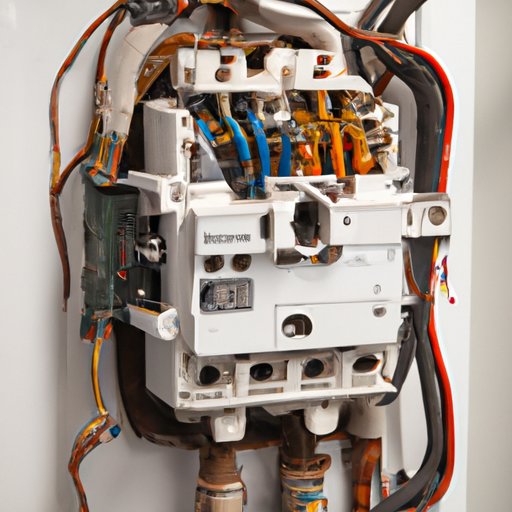Introduction
Have you ever experienced your water heater tripping the circuit breaker? It’s an irritating, yet common issue that can cause significant inconvenience. In this article, we will explore what causes a water heater to trip the circuit breaker and provide tips for avoiding the issue in the future.
Exploring the Causes of a Tripped Water Heater Circuit Breaker
There are several possible causes for a water heater tripping a circuit breaker. Here are some of the most common culprits:
Overloaded Circuit
If too many appliances are connected to one circuit, it can overload and trip the circuit breaker. This is especially likely if the total wattage of the connected appliances exceeds the circuit’s amperage rating.
Faulty Wiring
Faulty wiring can also be a factor. If the wiring is damaged or worn, it can cause the circuit breaker to trip. This could be due to a short circuit, which occurs when two wires touch each other and create a surge of electricity.
Loose Connections
Loose connections can also be a problem. If the connections between the wires and the circuit breaker are not secure, then it can cause the circuit breaker to trip.
Faulty or Old Circuit Breaker
A faulty or old circuit breaker can also be the cause of a water heater tripping a circuit breaker. If the circuit breaker is worn out or has been damaged, it can cause the circuit breaker to trip.
Troubleshooting Your Water Heater’s Circuit Breaker Problem
If your water heater trips the circuit breaker, there are a few steps you can take to troubleshoot the problem. Here are some tips:
Check the circuit breaker panel
The first thing you should do is check the circuit breaker panel. Make sure all the switches are flipped to the “on” position. If any of them are flipped to the “off” position, flip them back to “on” and see if the problem is resolved.
Check the wiring
Next, you should check the wiring for any signs of damage or wear. If you notice any frayed or exposed wires, you should contact a qualified electrician to repair them as soon as possible.
Check for loose connections
You should also check for any loose connections between the wires and the circuit breaker. Make sure all the connections are tight and secure.
Replace the circuit breaker if necessary
If the circuit breaker appears to be damaged or worn, you may need to replace it with a new one. If you are unsure of how to do this, contact a qualified electrician for assistance.

Understanding Why Your Water Heater Keeps Tripping Your Breaker
Now that we’ve explored the causes of a tripped water heater circuit breaker, let’s look at some of the reasons why your water heater may be causing it to trip. Here are some potential causes:
High Wattage Appliances
If you have other high wattage appliances connected to the same circuit as your water heater, this can cause the circuit to overload and trip the breaker. To avoid this, make sure all the appliances are on separate circuits.
Poorly Maintained Water Heater
If your water heater is poorly maintained, this can also lead to a tripped circuit breaker. Make sure to regularly inspect and maintain your water heater to keep it in good working condition.
Overheating
Finally, if your water heater is overheating, this can also cause the circuit breaker to trip. If you suspect your water heater is overheating, you should turn off the power to the unit and contact a qualified electrician for assistance.

What to Do When Your Water Heater Causes a Circuit Breaker Trip
If your water heater causes the circuit breaker to trip, here are some steps you should take:
Turn off the power to the water heater
First, turn off the power to the water heater by flipping the switch on the circuit breaker panel. This will prevent any further damage or injury.
Contact a qualified electrician
Next, contact a qualified electrician to inspect and repair the water heater. They will be able to diagnose the cause of the problem and make the necessary repairs.
Have your water heater inspected and serviced
Finally, you should have your water heater inspected and serviced by a qualified technician. This will ensure that the unit is functioning properly and will prevent any future problems.
Tips to Avoid Tripping Your Water Heater’s Circuit Breaker
To avoid your water heater tripping the circuit breaker, here are some tips:
Install a dedicated circuit for your water heater
If you don’t already have one, consider installing a dedicated circuit for your water heater. This will ensure that the water heater is the only appliance connected to the circuit, reducing the risk of an overload.
Make sure all connections are secure
Make sure all the connections between the wires and the circuit breaker are secure. Loose connections can cause the circuit breaker to trip.
Have your water heater regularly inspected and serviced
It’s important to have your water heater inspected and serviced by a qualified technician every few years. This will help ensure the unit is functioning properly and will reduce the risk of a circuit breaker trip.
Turn off other high wattage appliances when using the water heater
Finally, if you are using your water heater, make sure to turn off any other high wattage appliances connected to the same circuit. This will reduce the risk of an overload.
Conclusion
A tripped water heater circuit breaker can be a nuisance, but it’s usually an easy fix. By understanding the common causes of the issue and following the tips outlined above, you can prevent it from happening in the future.
(Note: Is this article not meeting your expectations? Do you have knowledge or insights to share? Unlock new opportunities and expand your reach by joining our authors team. Click Registration to join us and share your expertise with our readers.)
